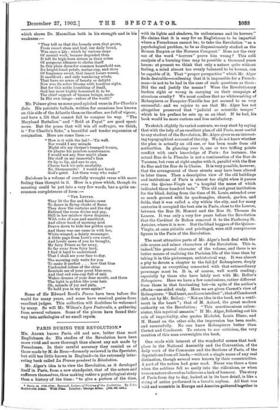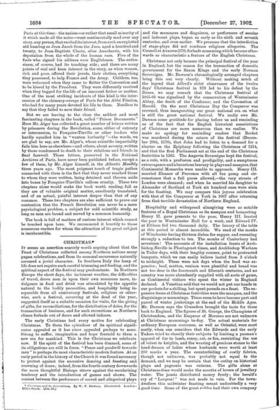PARIS DURING THE REVOLUTION.*
MR. ALGER knows Paris, old and new, better than most Englishmen do. His studies of the Revolution have been more vivid and more thorough than almost any not made by Frenchmen. In their careful accuracy they remind us of those made by M. de Broc—formerly reviewed in the Spectator, but still too little known in England—in the extremely inter- esting book called La France pendant la Revolution.
Mr. Alger's idea is to view the Revolution, as it developed itself in Paris, from a new standpoint, that of the actors and sufferers themselves, thus making rather a psychological study than a history of the time : "to give a picture of the time, . • Paris in 1789.1794: Farewell Letters of Victims of the Guillotina. By John Goldworth Aker. With Plan. London 3 George Alban. [108. Od. nota
with its lights and shadows, its enthusiasms and its horrors." He claims that it is easy for an Englishman to be impartial where a Frenchman cannot be; to take the Revolution "as a psychological problem, to be as dispassionately studied as the Roman Empire or the Norman Conquest." Does not the very use of the word "horrors" prove him wrong ? This cold analysis of a burning time may be possible a thousand years hence: at present we think that only a nature quite without feeling, a mind almost too evenly balanced to be human, can be capable of it. That "proper perspective" which Mr. Alger finds desirable—confessing that it is impossible for a French. man—is not to be had in the case of such questions as these : Did the end justify the means ? Were the Revolutionary leaders right or wrong in carrying on their campaign ef atrocious cruelty? We must confess that no whitewashing of Robespierre or Fouquier-Tinville has yet seemed to us very successful : and we rejoice to see that Mr. Alger has not altogether preserved that "judicial or scientific temper" which in his preface he sets up as an ideal. If he had, his book would be more curious and less satisfactory.
To sketch slightly its varied contents, we may start by saying that with the help of an excellent plan of old Paris, most useful to any student of the Revolution, Mr. Alger gives us an interest- ing topographical account of the city. We do not know whether the plan is actually an old one, or has ixeu made from old authorities. In glancing over it, one or two trifling points conflict with one's knowledge of Paris : for instance, the actual Rue de in Planche is not a continuation of the Rue de Varenne, but runs at right angles with it, parallel with the Rue du Bac and the Rue de in Chaise. It is very possible, however, that the arrangement of these streets may have been altered in later times. Then a descriptive view of the old buildings and institutions of Paris is almost too slight when it passes over the Quinze-Vingts as "a hospital the name of which indicated three hundred beds." This old and great institution for the blind, dating from the time of St. Louis, extended over so much ground with its quadrangles, church, garden, and fields, that it was called a city within the city, and for many centuries it occupied the best site in Paris, close to the Louvre, between the Rue St. Honore and the Rue St. Thomas du Louvre. It was only a very few years before the Revolution that the Cardinal de Rohan removed it to the Faubourg St. Antoine, where it is now. But the blind beggars of the Quinze- Vingts, at once pitiable and privileged, were still conspicuous figures in the Paris of the Revolution.
The most attractive parts of Mr. Alger's book deal with the side scenes and minor characters of the Revolution. This is, indeed,tthe general character of the volume, and there is no better means of realising the Parisian life of the time than by taking it in this picturesque, unhistorical way. It was almost a pity to devote a, chapter to the fall of Robespierre, deeply interesting as everything connected with that extraordinary personage must be. It is, of course, well worth reading; especially by those who have lately met with Mr. Belloo's Robespierre. Here we have a few conclusions, rather different from those in that fascinating but—in spite of the author's efforts—one-sided study. Here we are given Carnot's view of Robespierre: "Bad heart, mediocre intellect"; that of Condorcet (left out by Mr. Belloc) : "Not an idea in the head, not a senti- ment in the heart " ; that of M. Aulard, the great modern authority on the Revolution: "This sanctimonious calum- niator, this mystical assassin." If Mr. Alger, following out his rule of impartiality, also quotes Michelet, Louis Blanc, and M. Hamel on the other side, the impression has been made, and successfully. No one knew Robespierre better than Carnot and Condorcet. To return to our criticism, the very mention of this man overweights the book.
One reads with interest of the wonderful scenes that took place in the National Assembly and the Convention, of the daily work of the Commune and the Sections of Paris, of the deputations from all lands,—without a single name of any real distinction, though several were known by their eccentricities. A part of the nation had gone mad. Never was there a time when the sublime fell so easily into the ridiculous, or when human nature showed so ludicrous a lack of humour. The story of Paris from day to day, looked at in its bare detail, is like a string of antics performed in a lunatic asylum. All that was wild and eccentric in Europe and America gathered together in Paris at this time : the nation—or rather that small minority of it which made all the noise—went sentimentally mad over any story, any person, that excited its interest, from such an exploited old humbug as Jean Jacob from the Jura, aged a hundred and twenty, to Jean-Baptiste Clootz, alias Anacharsis, with his deputation from the whole of the human race. Five of the fools who signed his address were Englishmen. The enthu- siasm, of course, had its touching side; and there are many points of real and keen interest in the story, as when women, rich and poor, offered their jewels, their clothes, everything they possessed, to help France and the Army. Children, too, were welcomed when they came to flatter the Convention and to be kissed by the President. They were differently received when they begged for the life of an innocent father or mother. One of the most striking incidents of this kind is the inter- cession of the chimney-sweeps of Paris for the Abbe Fenelon, who had for many years devoted his life to them. Needless to say that they failed to save their friend.
But we are leaving to the close the saddest and most fascinating chapters in the book, called "Prison Documents." Here Mr. Alger has collected a great number of letters written by prisoners during the Revolution, some, either of entreaty or intercession, to Fouquier-Tinville or other leaders who hardly equalled him in "wanton barbarity "—the words, we are glad to say, are Mr. Alger's, whose scientific impartiality falls him here as elsewhere—and others, about seventy, written by those condemned to death to their relations and friends in final farewell. These letters, preserved in the National Archives of Paris, have never been published before, except a few of them, by Mr. Alger himself, in the Atlantic Monthly three years ago. The most poignant touch of tragic pathos connected with them is the fact that they never reached those to whom they were written, being detained and thrown aside into boxes by Fouquier-Tinville's callous cruelty. These two chapters alone would make the book worth reading, full as they are of valuable original matter, excellently translated, and of an actual, painful interest deeper than that of any romance. These two chapters are also sufficient to prove our contention that the French Revolution can never be a mere psychological problem, a subject for cold scientific study, as long as men are bound and moved by a common humanity.
The book is full of matters of curious interest which cannot be touched upon here. We recommend it heartily to those numerous readers for whom the attraction of its great subject is inexhaustible.







































 Previous page
Previous page